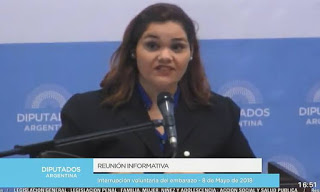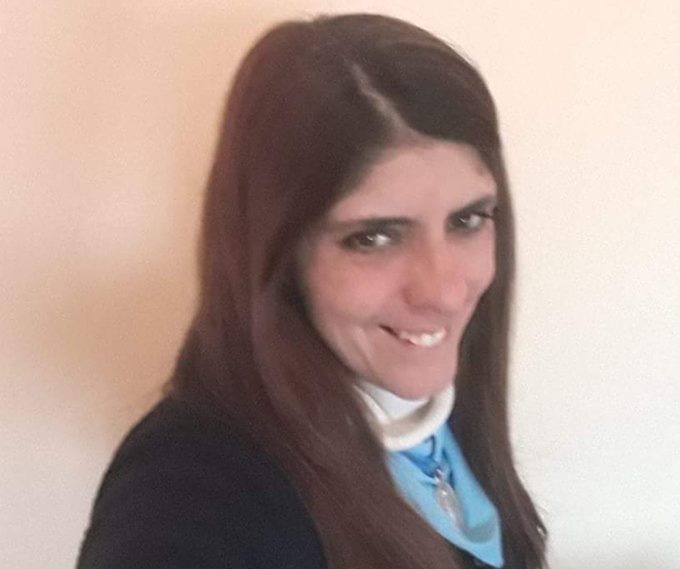
Let’s go back to the 1970’s. A young, newly married couple from Buenos Aires dreamed of starting a family. But instead, they suffered several failed attempts to get pregnant. Their desire increased as the months and years passed. Treatments, prayers, . . . nothing seemed to work, until they decided to start the adoption process.
They endured tough requirements, bureaucratic procedures and in-depth investigations in order to be classified as good candidates. Finally, they managed to match all the required parameters to be adoptive parents.
However, as this couple began preparations to adopt, there was a tragedy transpiring. It was 1978 in the province of Chaco. A teenager suffered a sexual attack in which she became pregnant by her rapist. Alone, helpless, humiliated and without any hope, she went to a house — a hospice as we say. She lived through the pregnancy with great courage. She had run away from home — possibly because her family abandoned her, or possibly to avoid being shamed by others.
She had her baby daughter with a normal weight of just under 8 lbs. Afterward, she wandered everywhere with the baby in her arms, until she finally decided to place her for adoption. She went to what we call a cradle house and with great sadness and hope, handed her baby over with the clothes she was wearing.
The staff of the cradle house gave the baby girl love and affection. No more was heard of that young teenager. . . .
The baby lived among children, nurses and caregivers who struggled every day to keep the house decent and clean, given that the economic situation was unsustainable.
One day, that couple from Buenos Aires received the call of God — the happiest news of their lives: “There is a baby who was placed for adoption. Can you travel as soon as possible to the Province of Chaco?”
The future parents were very excited. They cried and hugged for half an hour, thanking God for their prayers being answered.
Upon arriving in the province of Chaco, they went to the cradle house. It was fresh. When they got there, they were received by many children with the hope of leaving that hospice with their adoptive family. Children were running everywhere. The maintenance staff was pleading for money for the arrangements of the property.
Then, the young future adoptive father went to the mall and bought them a new kitchen as a donation. When he returned, he went to one of the many cradles where a baby girl in diapers rested, thin and abandoned.
Without knowing which crib her awaiting baby was in, the wife had moved forward past the row of cribs with great anxiety. As she approached crib number 22, the baby girl opened her huge eyes and cried. With compassion in her heart, the young woman picked her up, cradled her with a lot of love in her arms and the baby stopped crying; the young mother did not release her anymore.
That mother was Luz María and that baby was ME.
The caretakers and nurses of the home asked my mother how she knew this was the baby she was about to adopt and, merrily, she answered: “mother’s intuition.”
Then all the procedures corresponding to the birth certificate in the Civil Registry were carried out. They named me Maria de la Paz, consecrating me to the Virgin Queen of Peace. We returned happily to Buenos Aires. There my great-grandmother, grandparents, uncles and cousins awaited us. They had a party and baptized me.
When I was two years old, I had curiously asked my mother if I had been in her tummy, and she said no. I left it at that and we followed life normally. I went to kindergarten, I played with my cousins and friends, and I received my First Communion and Confirmation. I had a very happy childhood, enjoying many birthday parties and Christmas.
When I began adolescence, I started to wonder everything, including my origin. There was a lot of secrecy about my pre-adoption history. I was missing 8 months of my life which were empty — I did not know anything about that time.
When finishing secondary education, I began to work. I lived the normal life of a young girl going out to the world, to society. But I never stopped thinking about those 8 empty months of my life. Nobody told me anything.
Years passed, I got married and had two daughters. I completed several specialization courses for my career. I am a therapeutic caregiver, integrative teacher, geriatric assistant, community play director. I am also a catechist in the Diocese of San Miguel Arcángel in Buenos Aires.
It wasn’t until 2007 when an aunt told me that my birthmother had been raped and, as a result of that attack, I was born. I said nothing about this cruel truth. I went on with my life, until one day, I could not take so much pain anymore.
I felt guilty about being born and decided to compensate my biological mother with my life. I offered my whole being to God and after a terrible period of depression, I took pills to relieve myself of the pain. I was hospitalized for several days as a result.
My parents and family suffered a lot from this. They were angry with me, as they did not understand the situation — a typical reaction, I think.
I managed to recover, thanks to my prayer group, my daughters and family, my in-laws and my friends. With the time going by, I accepted my reality.
I had two mothers — one who courageously gave me life and another who gave me her life until her last breath.
It was the summer of 2015 as I was riding a bike through Bella Vista when I saw a sign with the image of an 8-week-old baby asking to be born. I did not understand the claim. Then I called the number that appeared and contacted those who organized that campaign “El Bebito” (the little baby).
I joined their Facebook campaign and started a wonderful connection with Mariana Rodríguez Varela through her sister Helena. They provided me with material to publish and I became a pro-life warrior!
At that time, I knew a teenager who became pregnant, but she did not want that unborn baby. I had enough information to teach that girl the truth that what she had in her tummy was not a bunch of cells, but a baby. After long days of dialogue and contention, she decided to continue with the pregnancy! That experience made me reflect and, immediately, I applied it to my own life.
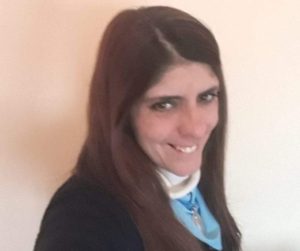 I still was unable to tell publicly that I was an unwanted baby conceived during a rape . . . , until things became very difficult in my country, The Republic of Argentina, with the bill of “voluntary interruption of pregnancy” which would have legalized abortion for any reason through 14 weeks and up until birth in cases of rape.
I still was unable to tell publicly that I was an unwanted baby conceived during a rape . . . , until things became very difficult in my country, The Republic of Argentina, with the bill of “voluntary interruption of pregnancy” which would have legalized abortion for any reason through 14 weeks and up until birth in cases of rape.One day commenting on Facebook in favor of life, I saw someone suggest that “in cases of rape” it would be good for the rape victim to decide “with her body” by getting rid of the fetus she carries in her womb. Of course, I did not agree with that statement. Then I commented freely — for the first time ever. Their ignorance and cruelty liberated me!
But then I received frightening messages from a relative — a close cousin — who tried to make me feel guilty for being born, saying that all the abandoned children should have been aborted, that the adopted ones should not have existed. Privately she told me that I was guilty of what had happened to my biological mother and that I should not have existed. As perhaps you can imagine, I felt very badly reading all of these things from a family member.
That afternoon I fainted. I could not get out of bed, and I cried all the time. I had the signs of that depression again. Then I sent a message on WhatsApp to Mariana Rodríguez Varela crying and renouncing my participation in the “El Bebito” campaign. I felt very badly for being born thanks to that insulting cousin.
Immediately, Mariana asked me: “Are you adopted?” And I answered: “Yes.” It was at that moment that Mariana sustained me with a lot of love, and told me that I was a beautiful story of love.
From that moment, I celebrated my life. I resurrected. I had lived years of pain, but now I received the Grace of God through the respect, kindness and affection of Mariana.
I felt very proud of my adoptive parents (or parents of the heart as we say), and I proudly went out into the streets again with the banner of “ElBebito.”
It was during an afternoon coffee break when I saw the speech of a young woman named Karina Estrella Etchepare in the Honorable Chamber of Deputies of the Congress of the Argentine Nation. Her words left me speechless as she shared her story of having been conceived in rape and placed for adoption.
Then, I said to myself: “I am also an adopted daughter who was born in rape” — the world has to know my humble history.
I started posting on all the networks that I am happily adopted and the result of a violation. I felt that I should honor my birthmother because of how brave she was to give me up for adoption, choosing life despite the pain she suffered. Maybe it was not easy for her to surrender me in that cradle house, but that’s what she could do, giving me the opportunity to live.
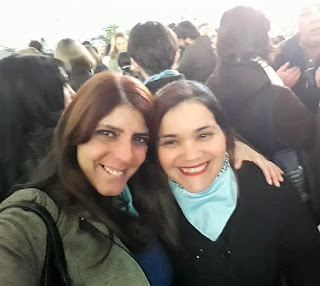 Karina Estrella Etchpare and I became friends, along with many others from Salvar El 1 who were conceived in rape or became pregnant by rape. These are my sisters!
Karina Estrella Etchpare and I became friends, along with many others from Salvar El 1 who were conceived in rape or became pregnant by rape. These are my sisters!When they use the pretext of aborting the baby in cases of rape, I do not agree that the baby is condemned to death since she is an innocent being. The father should be condemned for the crime he committed — not the baby.
Who dares to tell me that my life is worth less than that of anyone who was born during an act of love? I am not an abomination of nature for having been an unwanted baby! I can love and be loved. I am irrefutable proof that my life and my daughters lives are the result of God’s triumph on earth.
With my humble story, I want to leave the following legacy to my daughters, to all of the daughters of Argentina, and to all the daughters of the world: Abortion is not the solution, abortion doesn’t stop a woman from being a mother because, since the moment of conception, the woman will always be a mother. The “choice” made is whether to be Mother to a living child or a dead child.
Sadly, here in Argentina, it has been legal since the 1920’s to abort a child conceived in rape through 14 weeks. But my birthmother, with a lot of pain, continued valiantly with her pregnancy giving me the possibility of life. That’s why I say yes to life, without exception!
Thanks to the love of my whole family, great-grandmother, grandparents, uncles, aunts, cousins (the good ones), instead of being an “unwanted baby” I became an “expected baby.”
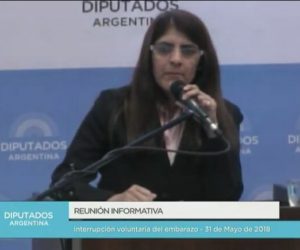 Biography: Maria Paz Rodríguez Coronel Dudignac lives in Buenos Aires, Argentina. She is the mother of two girls, a therapist, and a blogger, pro-life speaker and Facebook contributor for Salvar El 1 — the Spanish division of Save the 1.
Biography: Maria Paz Rodríguez Coronel Dudignac lives in Buenos Aires, Argentina. She is the mother of two girls, a therapist, and a blogger, pro-life speaker and Facebook contributor for Salvar El 1 — the Spanish division of Save the 1.
